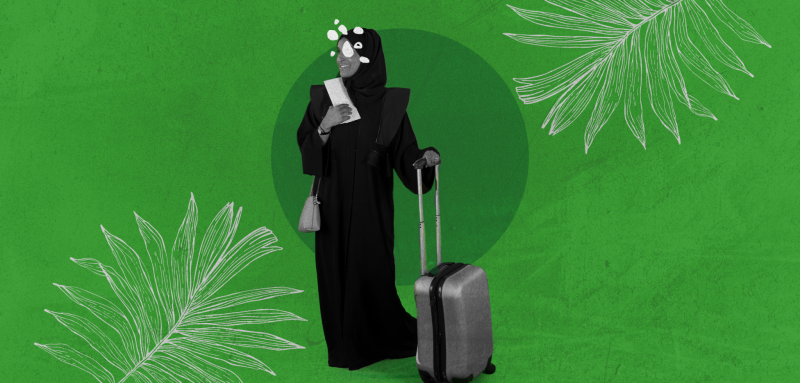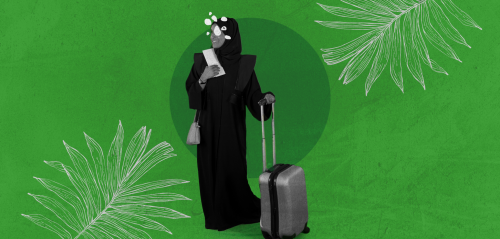On September 26, 2017, a major decree was issued, marking the beginning of a series of decrees that will bring about a paradigm shift in the lives of Saudi women. On that day, King Salman bin Abdulaziz issued a decree allowing women to drive.
June 24, 2018 was the first day that saw Saudi women drive. The newspapers were buzzing with this major change. Some saw it as a qualitative shift in the history of Saudi women, while others considered it the spark marking a social and cultural openness that would positively affect women.
The Most Notable Variables
The following years brought about many changes regarding the status of women in the Arab kingdom. The women of Saudi Arabia welcomed these changes wholeheartedly, as if they were now living in a new era they’ve never seen before.
Previously, a Saudi woman needed to have a male legal guardian or wakil to be able to invest her money within Saudi. Then came a decision by the Saudi Ministry of Commerce to cancel this requirement in all women’s institutions, with the aim of pushing women to participate and contribute to the national economy. The decision came following a women’s campaign that had been launched by Saudi businesswomen after they witnessed and were targeted by scams and fraud via the legal guardian system.
August 2019 witnessed a new government decision that reflected some visible changes within Saudi society. Saudi women aged 21 years and over were allowed to obtain a passport on their own and travel abroad without the prior approval of the “parent or legal guardian”. This decision is included among another set of decisions that are aimed at helping bring about cultural openness.
Recently, Saudi women have benefited from the decision to limit the powers of the ‘Committee for the Promotion of Virtue and the Prevention of Vice’, which is a government religious authority that acted as a watchdog over the behavior of residents, especially women. Thus, they are now free to take off or wear the hijab as they choose to.
A new decision registered in June 2021 was issued by the Ministry of Hajj and Umrah, allowing female citizens and residents to perform the Hajj pilgrimage without the need for a mahram (male family member escort) with them, provided that they go in groups. The same stipulation was also set on females performing the Umrah pilgrimage.
Wildest dreams come true
The founder and editor-in-chief of “Kol Al-Watn”, the first online newspaper in Saudi Arabia, Hedaya Darwish, has commended Prince Mohammed bin Salman, whose rise in the Saudi ruling political scene has been directly linked to these changes since his appointment as crown prince.
She tells Raseef22, “Prince Mohammed stood by Saudi women, and helped them enter all the businesses they can participate in, which is something that no one else had ever done before.”
She added: “Him standing by the Saudi woman has given her a high morale and strength that she only used to dream of and has waited for for too long.” It has also provided her with a great opportunity to empower herself within society and work in a number of various fields, “The support of His Royal Highness Prince Mohammed bin Salman has given the Saudi woman the strength she needed many years ago.”
Over a period of few years, Saudi women were allowed to drive, invest, travel, remove the hijab, file a lawsuit and go to Hajj without a male guardian... Journalist Hedaya Darwish opens up on what it’s like to be a Saudi woman today
Darwish believes that Saudi women are very capable of creativity and action. She says that the government’s decisions that changed their situation within society has given them “a great deal of strength to work and participate in various fields,” noting that the two decisions to abolish the wakil and the mahram, “are two important steps that gave women the power and ability to participate in all matters that confirm the true extent of her potential for years.”
A golden age for women
“It is an indisputable fact that what happened to Saudi women in terms of progress and empowerment has undoubtedly made them begin experiencing their golden age,” a board member of the Theater and Performing Arts Commission in Saudi Arabia, Malha Abdullah, tells Raseef22.
She affirms that women in the Kingdom have reaped plenty of gains, whether in terms of social empowerment, arts, or others. She objects against the views that claim that these reforms contradict or are against Islam. In her opinion, “what His Royal Highness has adopted in decisions only revolve around customs, traditions and true religion, and do not depart from that.”
Changes in the status of women have had an impact on Malha Abdullah’s personal career first hand. In direct relation, she was appointed as a board member of the Theater and Performing Arts Commission, having 30 years of experience in Saudi theater under her belt.
She commends the decision to establish multiple bodies in the Ministry of Culture, and to start establishing an academy for theater and performing arts, as well as building several theaters. She considers that these decisions reflect the efforts being made to advance the country, its people, and the way of thought there, commenting “We are now living in the age of enlightenment.”
A qualitative phase
The same positive and celebratory view has been expressed by Samira Al-Ghamdi, president of the ‘Himaya Association for Family Care’ that provides services to protect female victims and minors in Saudi Arabia. She tells Raseef22 that the last five years cannot even be compared to all the past years combined, “It was a qualitative and transitional phase in the life of every Saudi woman, and not just in my own life.”
In addition to the decision to allow women to drive a car — after “Saudi Arabia had been the only country that did not allow women to drive” — and the decision to allow a woman to travel alone, which “supports her social empowerment,” Al-Ghamdi placed a great deal of emphasis on the decision to revoke the wakil, since “a woman now has control over her own wealth, instead of it being controlled by a man.” In addition, “a woman needed a wakil to be able to file a lawsuit in court, and can now do so on her own, and this is the legal empowerment she needed.”
"Yes, a Saudi woman can now decide to travel without a male guardian's authorisation, but she is susceptible to being reported for "absenteeism and disobedience" if her parents are opposed to her travel". On loopholes needing attention in Saudi today
“The recent decisions contribute to building the full rights of the new generations, who may be shocked when we tell them about what the Saudi woman used to be subjected to in the past,” she says, noting that empowering the Saudi woman “are not some rhetorical terms or media phrases that are said without actually being implemented in reality. We are the ones who live in the country, we have lived in it in the past, and we see what is happening right now.”
Loopholes that need to be filled
“The laws that have been recently enacted are great,” Saudi activist Shoa’a Al-Zahrani confirms to Raseef22, but says that “there are loopholes that prevent all the women from benefiting from them,” since the rights “are subject to the parents or legal guardian’s acceptance or rejection of them.”
She mentions, for example, the decision to drive a car, reminding that no woman can do so, if her parents or legal guardian objects.
She also commented on the decision to let women travel without a mahram, saying, “Yes, a woman can travel, but she is susceptible to reports of absenteeism and disobedience in the event that her parents are against her traveling. This could result in her being recorded imprisoned or placed in a care home, a place that she will not be able to leave without the consent of her legal guardian.”
Despite her reservations over the course of things, Al-Zahrani asserts that “the current situation in Saudi Arabia is new, and unprecedented. It is relatively different for some Saudi women who already have open and supportive families.”
In her opinion, women need new laws that will give them more rights, such as the right to pass on their nationality to their children if they marry a foreigner.
Al-Zahrani criticizes the Saudis who are objecting to the changes taking place, and are fighting any decision concerning women, “even if it was superficial, illusory, or fictitious.” She says that “most of these people have consumed and soaked up the narrative of the guardianship of man over woman, so much so that they now see it as an indisputable right for man.” She expresses her wishes that “the situation will always continue to change for the better, and that empowerment will become a reality.”
Raseef22 is a not for profit entity. Our focus is on quality journalism. Every contribution to the NasRaseef membership goes directly towards journalism production. We stand independent, not accepting corporate sponsorships, sponsored content or political funding.
Support our mission to keep Raseef22 available to all readers by clicking here!
Interested in writing with us? Check our pitch process here!





Join the Conversation
ذوالفقار عباس -
3 hours agoا
Hossam Sami -
4 hours agoصعود "أحزاب اليمين" نتيجة طبيعية جداً لرفض البعض; وعددهم ليس بالقليل أبداً. لفكرة الإندماج بل...
Anonymous user -
1 day agoرائع و عظيم ..
جيسيكا ملو فالنتاين -
5 days agoزاوية الموضوع لطيفة وتستحق التفكير إلا أنك حجبت عن المرأة أدوارا مهمة تلعبها في العائلة والمجتمع...
Bosaina Sharba -
1 week agoحلو الAudio
شكرا لالكن
رومان حداد -
1 week agoالتحليل عميق، رغم بساطته، شفاف كروح وممتلء كعقل، سأشاهد الفيلم ولكن ما أخشاه أن يكون التحليل أعمق...